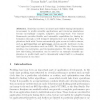Free Online Productivity Tools
i2Speak
i2Symbol
i2OCR
iTex2Img
iWeb2Print
iWeb2Shot
i2Type
iPdf2Split
iPdf2Merge
i2Bopomofo
i2Arabic
i2Style
i2Image
i2PDF
iLatex2Rtf
Sci2ools
111
Voted
PPAM
2007
Springer
2007
Springer
An Extensible Timing Infrastructure for Adaptive Large-Scale Applications
Real-time access to accurate and reliable timing information is necessary to profile scientific applications, and crucial as simulations become increasingly complex, adaptive, and large-scale. The Cactus Framework provides flexible and extensible capabilities for timing information through a well designed infrastructure and timing API. Applications built with Cactus automatically gain access to built-in timers, such as gettimeofday and getrusage, system-specific hardware clocks, and high-level interfaces such as PAPI. We describe the Cactus timer interface, its motivation, and its implementation. We then demonstrate how this timing information can be used by an example scientific application to profile itself, and to dynamically adapt itself to a changing environment at run time.
Related Content
| Added | 09 Jun 2010 |
| Updated | 09 Jun 2010 |
| Type | Conference |
| Year | 2007 |
| Where | PPAM |
| Authors | Dylan Stark, Gabrielle Allen, Tom Goodale, Thomas Radke, Erik Schnetter |
Comments (0)

